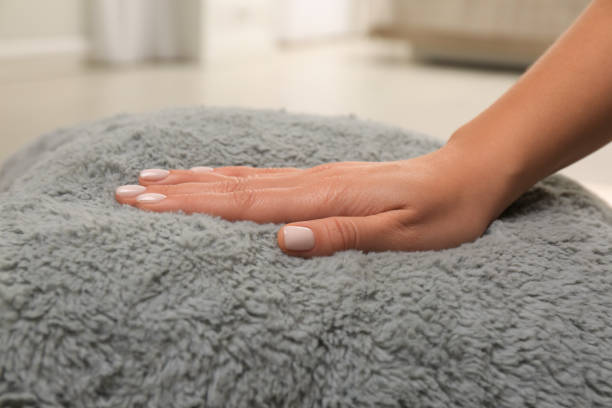Introduction

Living with Parkinson's disease (PD) can often be challenging, but one of the most difficult symptoms to manage is sleep disruption. People living with PD may experience disruptions in their circadian rhythms and difficulty getting good restorative sleep due to muscle stiffness, anxiety, or even the medications they are taking.
Fortunately, several strategies can help create a more comfortable space for restful sleep. The following blog post will offer advice on creating an optimal sleeping environment that can enhance your physical and mental well-being when coping with symptoms of PD.
What is Parkinson's Disease?
PD is a type of neurological disorder that worsens over time and causes difficulties with movement. The death of dopamine-producing brain cells causes it and leads to debilitating motor symptoms, such as tremors, rigid muscles, slow movements, poor balance, and coordination. The condition can also impact sleep quality due to insomnia, fatigue, and daytime sleepiness.
Tips to Create a Sleep-Friendly Environment for Parkinson's disease management
1. Lighting
Lighting is important when creating a sleep-friendly environment for Parkinson's Disease management. Bright lights can cause alertness and difficulty in falling asleep, so using softer lighting at night is important. To ensure a good night's sleep, try adding blackout curtains or shades to the bedroom windows, dimming the, and using a nightlight instead of bright overhead lighting. Invest in light bulbs that emit warm colors such as peach or yellow. These colors will encourage sleep and facilitate a faster drift-off to sleep.
Limiting blue light exposure from digital devices before bedtime is also important. Many smartphones, tablets, and computers come with a "night mode" setting that will reduce the amount of blue given off from the device. To lower your exposure to blue light, you may opt to use an app or wear blue-blocking glasses.
2. Temperature
Temperature can also play a role in creating a sleep-friendly environment for Parkinson's Disease management. Maintaining a comfortable temperature in your bedroom at night is crucial. Experiencing either excessive heat or coldness in the room can hinder your ability to initiate and maintain sleep. Having air conditioning, fans, or a heat source such as an electric blanket helps to control the temperature. Keeping the bedroom at cooler temperatures (around 65 degrees Fahrenheit is ideal) can also encourage more restful sleep.
It's also important to avoid extremes in temperature, as this can disrupt nighttime sleep. Taking a hot shower before bed can make it difficult to fall asleep because it increases your body temperature. Similarly, if your room is too cold, you may wake up continuously due to feeling chilly. Avoiding extreme temperatures can encourage more restful sleep throughout the night.
3. Noise
Noise levels can greatly affect sleep, so it's important to be mindful of the sounds in your sleep environment. To limit noise, you can use soft music or white noise to drown out any disruptive noises outside your window or inside your home. Additionally, investing in earplugs or a sound machine helps to create a consistent, soothing sound in the background while you sleep.
It's also important to avoid loud noises or activities that can disrupt your sleep. It is recommended not to listen to loud music or television programs before bed to sleep better. Using noise-canceling headphones or earplugs if you must listen to something can help keep the sound levels conducive to sleep.
4.Comfort
Finally, ensuring a comfortable environment is essential for creating a sleep-friendly environment for Parkinson's Disease management. Use comfortable bedding, such as sheets and blankets of natural cotton or bamboo. Additionally, an ergonomic mattress can help provide the support your body needs throughout the night.
You can also use a weighted blanket that provides extra comfort and helps calm the body. Finally, ensure your bedroom is free of distractions such as technology devices, books, or clutter, as these can be too stimulating right before bedtime. When setting up your sleep environment, remember to keep it comfortable to create a more restful sleep experience.
5. Right mattress
The right mattress is essential to ensure a restful night's sleep for those with Parkinson's Disease. The best mattresses for people with Parkinson's are usually medium-firm, providing support, comfort, and pressure relief. Memory foam mattresses offer great contouring abilities to help reduce pain in pressure points and provide overall support. Moreover, a mattress with sturdy edges can offer additional stability and help lower the risk of falls.
When shopping for the right mattress, it's important to test out several different mattresses to find one that is comfortable and supportive. Memory foam mattresses are a popular option because they are temperature-regulating, which helps keep the body cool and comfortable throughout the night. Additionally, avoid too soft mattresses, as these can cause misalignment and reduce support for Parkinson's Disease management.
6. Soft Pillows

Soft pillows are an important factor in establishing a sleep-friendly environment for those with Parkinson's Disease. The right pillow should provide the perfect balance of comfort and support while any discomfort or pain is caused by alignment. It's important to find a pillow that is tailored towards individual needs, as well as a sleeping position.
For people with Parkinson's, a few different pillows can provide comfort and support while they sleep. Memory foam pillows offer a balanced combination of comfort and support since the material conforms to the head and neck shape. Additionally, shredded memory foam pillows allow users to adjust the pillow for their needs. customize
Explain how sleep disturbances can impact the overall quality of life and Parkinson's symptoms.
Sleep disturbances, including difficulty falling and staying asleep, are common among those with Parkinson's disease (PD). This can seriously impact the overall quality as it can cause daytime sleep, fatigue, mood changes, and mobility. Additionally, disrupted sleep can worsen the motor symptoms associated with PD. Therefore, it is important to create a sleep-friendly environment to manage Parkinson's and improve the overall quality of life.
Establish a soothing pre-bedtime routine
Creating a soothing and regular nighttime ritual can help your body recognize that it's time to unwind and destress. Consider activities such as having a warm bath or shower, listening to calm music, or doing gentle stretches.
Avoid caffeine
To improve your ability to sleep, it's best to avoid consuming caffeine, like coffee and energy drinks, for at least 6 hours before going to bed. Consuming caffeine can interfere with your ability to sleep by disrupting your natural light sleep cycle.
Avoid eating a large meal before bed.
Eating a big meal before bedtime can cause indigestion, making it harder to fall asleep. Try to eat your last snack of the day at least two hours before your planned bedtime.
Exercise

Exercising during the day can regulate your hormones and improve nighttime sleep. It is recommended to do cardiovascular exercises regularly throughout the week and to include at least two to three days of gentle stretching and relaxation exercises.
Keep your bedroom cool.
Keeping your bedroom comfortable between 65 and 70 degrees Fahrenheit can help you sleep more soundly. Sleep may become uncomfortable if the temperature is too high or too low, as your body may have trouble regulating its temperature.
These tips aim to improve the overall quality of life for individuals with Parkinson's by creating a sleep-friendly environment.
Why is a sleep-friendly environment important for Parkinson's disease management?
A sleep-friendly environment can help reduce fatigue, improve mobility, and reduce symptoms of Parkinson's Disease. Parkinson's commonly causes fatigue, affecting everyday tasks such as walking and talking.
A good night's rest helps to restore energy levels, enabling an individual to handle everyday tasks better. Additionally, research has that a good night's sleep may reduce Parkinson's-related tremors and other motoric symptoms.
What are the common sleep problems associated with Parkinson's disease?
The most common sleep problems associated with Parkinson's disease include:
-
I have trouble sleeping and experience difficulty falling asleep and staying asleep. Additionally, I find it challenging to wake up early in the morning.
-
The message concerns the condition known as rapid eye movement (REM) sleep behavior disorder (RBD).
-
Restless legs syndrome (RLS).
-
Excessive daytime sleepiness.
Some individuals may also experience insomnia, nightmares, and parasomnias. Additionally, Parkinson's disease medications can cause side effects that interfere with sleep.
FAQ's
How can I improve my sleep quality with Parkinson's?
Getting good sleep is important for people with Parkinson's. There are several ways to enhance the quality of your sleep. To improve your sleep, try these methods: exercise regularly, don't consume caffeine or alcohol before bedtime, establish a consistent sleep schedule, practice relaxation techniques like yoga or meditation before bed, take daytime naps, and avoid screen time for at least an hour before sleeping.
What is the best sleeping position for Parkinson's disease?
The best sleeping position for Parkinson's disease is to sleep on your side and with a body pillow. This will help alleviate pressure on the joints and muscles and improve circulation. Consider using an adjustable mattress or bedding to cushion you in those areas where stiffness sets in. Finally, ensure that your head, neck, shoulders, and legs are all supported when you sleep to reduce discomfort.
What lifestyle modifications can be done for Parkinsonism?
Making lifestyle modifications can help improve the symptoms of Parkinsonism. There are several things to do to maintain good health, such as following a balanced diet, exercising regularly, controlling stress, and staying away from environmental toxins. Additionally, medications such as dopamine agonists or monoamine oxidase inhibitors may be prescribed by your doctor to help manage the disease.
What is most important in improving the quality of life for a person with Parkinson's disease?
Leading a healthy and active lifestyle is crucial for enhancing the quality of life of those affected by Parkinson's disease. This includes regular physical activity, managing stress levels, staying connected with family and friends, staying engaged in activities you enjoy, having a positive attitude, and seeking social support from others with the same condition.
How can I increase my dopamine naturally for Parkinson's?
Increasing dopamine levels naturally for Parkinson's can be done by engaging in activities that improve cognition, such as puzzles and memory games. Nutrition is also important in helping to increase dopamine levels, so eating foods high in tyrosine, an essential amino acid precursor of dopamine, may help.
Conclusion
In conclusion, individuals living with Parkinson's disease can benefit from creating a sleep-friendly environment. This includes managing symptoms such as fatigue and insomnia, establishing a regular sleep schedule and sticking to it, avoiding screens for at least an hour before bedtime, eating a balanced diet, engaging in activities that improve cognition, staying connected with friends and family, and staying active. Additionally, lifestyle modifications and medications may be prescribed by your doctor to help manage the disease. Finally, maintaining a positive attitude can go a long way in helping individuals with Parkinson's lead quality lives.

